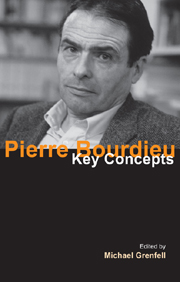Book contents
- Frontmatter
- Contents
- Contributors
- Acknowledgements
- Introduction
- PART I BIOGRAPHY, THEORY AND PRACTICE
- PART II FIELD THEORY: BEYOND SUBJECTIVITY AND OBJECTIVITY
- PART III FIELD MECHANISMS
- PART IV FIELD CONDITIONS
- 9 Interest
- 10 Conatus
- 11 Suffering
- 12 Reflexivity
- Conclusion
- Postscript: methodological principles
- Chronology
- Bibliography
- Index
11 - Suffering
from PART IV - FIELD CONDITIONS
- Frontmatter
- Contents
- Contributors
- Acknowledgements
- Introduction
- PART I BIOGRAPHY, THEORY AND PRACTICE
- PART II FIELD THEORY: BEYOND SUBJECTIVITY AND OBJECTIVITY
- PART III FIELD MECHANISMS
- PART IV FIELD CONDITIONS
- 9 Interest
- 10 Conatus
- 11 Suffering
- 12 Reflexivity
- Conclusion
- Postscript: methodological principles
- Chronology
- Bibliography
- Index
Summary
The names which construct social reality as much as they express it are the crucial stakes of political struggle.
(Bourdieu 1994d: 134)Introduction
We can say that Pierre Bourdieu was preoccupied with how societies work throughout his career. The concepts he developed, such as habitus, field and cultural capital have had tremendous heuristic and ontological value for those who study society. While I do address how societies function in this chapter, the emphasis here is on what Bourdieu implicitly tells us about why we should bother studying society at all. According to Bourdieu, contemporary social hierarchies and social inequality, as well as the suffering that they cause, are produced and maintained less by physical force than by forms of symbolic domination. He refers to the results of such domination as symbolic violence. Although explicit reference to such violence is not present in all of Bourdieu's publications, I follow Wacquant (Bourdieu & Wacquant 1992a: 15; Wacquant 2005b: 133) in arguing that the concept informs his entire body of work. In fact, the notion of symbolic violence follows on, and is a consequence of, his understanding of language. He sees language as, “an instrument of power and action” as much as communication (see Eagleton, in Bourdieu & Eagleton 1992e: 111). Language itself is a form of domination. I argue that while symbolic domination may be seen to have played a part in all social formations, it is becoming more and more signifi- cant in contemporary, advanced capitalist societies.
- Type
- Chapter
- Information
- Pierre BourdieuKey Concepts, pp. 183 - 198Publisher: Acumen PublishingPrint publication year: 2008
- 25
- Cited by

